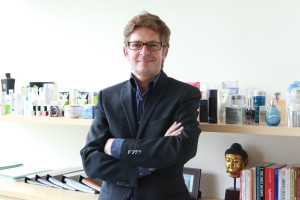Dan Zhu, board member of the Chamber’s Shanghai Chapter and Chair of the Shanghai HR Working Group, talks to Christophe Gamet, HR Director for L’Oreal China about the challenge of recruiting in China. Gamet explains that by implementing global standards for their talent management strategy they maintain an advantage in attracting the best Chinese talent, both at home and abroad.
Dan Zhu (DZ): What sets L’Oreal apart from other MNCs in terms of talent strategy?
Christophe Gamet (CG): L’Oreal, like all other multinational or local companies, is facing a battle for talent in the Chinese market. Being a world leader in the beauty industry, and driven by very ambitious objectives, we must set up a first-class talent strategy to fulfil our business needs and to prepare the future Chinese leaders who will direct our company.
The first priority is to retain and develop our internal talent, giving them opportunities to grow and accept responsibilities early on. ‘Take a bet on people and promote them’ is our philosophy. We conduct systematic talent review meetings with all top managers in order to identify all talent within the organisation.
The second priority is to enrich our pool of talent through external acquisitions. We have completely transformed the way we identify strong potential candidates for the group throughout the world. We are able to identify and recruit talent without boundaries thanks to our network of talent managers. For instance, last year we piloted a new programme called ‘Sourcing Chinese Talents Abroad’ between our HR teams in China and the USA, to identify and recruit Chinese candidates from the best American universities.
DZ: What does L’Oreal expect from its talent?
CG: We acknowledge the complexity of the world, the global and the local. Our ability to make decisions and take action in an increasingly complex environment, by evaluating both rational and emotional facets, is what we call being a ‘poet and a peasant’. We are looking for people capable of combining both dimensions, but they also need to have vision, ambition, judgment, leadership, drive… and passion!
By our definition, a talent is someone who combines a high level of performance in his/her job and the potential to grow by at least two positions in the next years.
DZ: What are L’Oreal’s plans (in talent management) for building China into your largest global market?
CG: We have a clear strategy for our business growth and priorities, and our talent management strategy closely follows this ambition and vision.
Based on our overall business plan, we estimate the volume and types of key positions required by the organisation over the next few years. We also identify individuals from our existing talent pool who are capable of growing and filling positions. When there is a talent gap, we anticipate it and fill it through internal mobility or external acquisitions.
In terms of talent acquisition our priority is to hire and prepare the Chinese business leaders of tomorrow. They need to be equipped with the criteria and qualities already mentioned. Often, we don’t make an offer focused specifically on a vacant position, instead preferring to share a vision and ambition in terms of career development, and a new professional adventure with a mid- to long-term perspective. This is also an effective way of assessing the entrepreneurial spirit of the candidates.
DZ: How do you aim to develop and groom your local Chinese talents into leaders with a global view? In China we are now facing a severe talent shortage at managerial and executive levels, what can you do to improve this situation?
CG: Within the L’Oreal group, we created the role of Talent Directors in all the strategic regions or countries: USA, Latin America, Middle East & Africa, Asia Pacific and recently we created one in China. The key mission of the Talent Directors is to globalise our talent management approach through the mobility, development, scouting and recruitment of talent.
Exchanging talents between emerging and mature markets, or within regions, can also be an ideal opportunity to groom high potential and prepare strong leaders for the future. It can also test an individual’s ability to perform outside of their comfort zone, evolve their leadership and influencing skills, develop human sensitivity and improve their ability to manage complex situations.
Lastly, when universalising our recruitment activities, we initiated partnerships with other countries with the aim of recruiting Chinese in those markets, grooming them for a few years, before bringing them back so they can contribute to the growth of L’Oreal China. This is a good way of promoting diversity and multiculturalism within the organisation.



Recent Comments